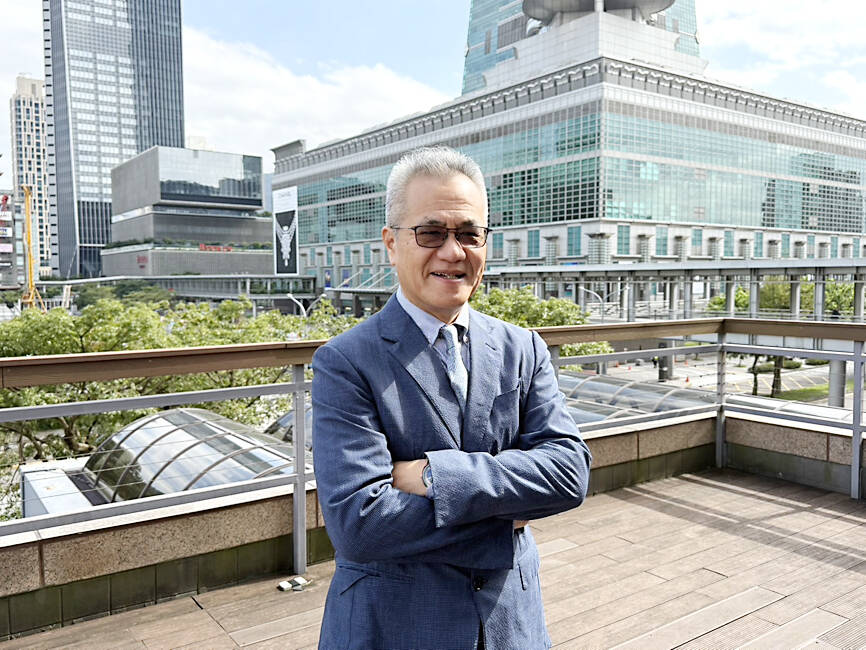WinWay Technology Co (穎崴), a chip testing interface supplier, yesterday said it aims to grow revenue by a double-digit percentage next year, thanks to rising demand for advanced testing services for artificial intelligence (AI) and high-performance computing (HPC) chips.
The AI boom has boosted demand for WinWay’s high-speed coaxial sockets, vertical probe cards and functional burn-in sockets this year, chairman Mark Wang (王嘉煌) said at a news conference in Taipei. A sizeable portion of the firm’s coaxial sockets and hyper sockets are used in HPC and AI chips.
WinWay’s revenue in the first 10 months of this year soared more than 50 percent year-on-year to NT$4.91 billion (US$151 million), the company said.

Photo: Grace Hung, Taipei Times
“The fourth-quarter orders received should push up our revenue this year to surpass the record hit in 2022,” Wang said. “We are optimistic about next year. We anticipate a double-digit percentage growth from this year.”
Since the lifecycle of AI chips is shrinking to about one year or one-and-a-half years, from two years in the past, such changes are stimulating demand for WinWay’s more complex testing services such as functional burn-in testing, Wang said.
As customer demand would be robust next year, WinWay plans to expand probe card capacity by about 50 percent, Wang said.
By the middle of next year, the company would see its probe card capacity surge to 4.5 million units a month, from 3 million units currently, he said.
Asked about potential impact of the imminent tariff hikes planned by US president-elect Donald Trump, Wang said it was hard to have a big picture yet.
However, the impact on WinWay should be very mild, as most of its direct customers are based in Taiwan, including foundry companies, chip packagers and chip testers, or their overseas operations in Southeast Asia, he said.
Only a small portion of its products are shipped to the US, he said.
WinWay has sales offices in the US and sees no urgent need to operate manufacturing facilities there, he added.
By region, North America made up about 61 percent of the company’s total revenue in the first three quarters of this year. Taiwan accounted for 24 percent.
WinWay is considering building one manufacturing facility in Malaysia over the next one to two years in response to customer demand for an alternative manufacturing site outside China and Taiwan, Wang said.
The company last year set up a sales and technology center in Penang, Malaysia, where Intel Corp and the world’s major chipmakers have operations, vice president Jason Chen (陳紹焜) said.
WinWay plans to establish a Malaysian subsidiary next year, as the country has become one of the world’s semiconductor hubs, given its robust growth of 7 percent in semiconductor production value over the past five years, he said.
The company reported that net profit in the first three quarters of this year more than doubled to NT$828 million from NT$406 million in the same period last year. That translated into earnings per share of NT$24.08, up from NT$11.84 a year earlier.

When an apartment comes up for rent in Germany’s big cities, hundreds of prospective tenants often queue down the street to view it, but the acute shortage of affordable housing is getting scant attention ahead of today’s snap general election. “Housing is one of the main problems for people, but nobody talks about it, nobody takes it seriously,” said Andreas Ibel, president of Build Europe, an association representing housing developers. Migration and the sluggish economy top the list of voters’ concerns, but analysts say housing policy fails to break through as returns on investment take time to register, making the

‘SILVER LINING’: Although the news caused TSMC to fall on the local market, an analyst said that as tariffs are not set to go into effect until April, there is still time for negotiations US President Donald Trump on Tuesday said that he would likely impose tariffs on semiconductor, automobile and pharmaceutical imports of about 25 percent, with an announcement coming as soon as April 2 in a move that would represent a dramatic widening of the US leader’s trade war. “I probably will tell you that on April 2, but it’ll be in the neighborhood of 25 percent,” Trump told reporters at his Mar-a-Lago club when asked about his plan for auto tariffs. Asked about similar levies on pharmaceutical drugs and semiconductors, the president said that “it’ll be 25 percent and higher, and it’ll

CHIP BOOM: Revenue for the semiconductor industry is set to reach US$1 trillion by 2032, opening up opportunities for the chip pacakging and testing company, it said ASE Technology Holding Co (日月光投控), the world’s largest provider of outsourced semiconductor assembly and test (OSAT) services, yesterday launched a new advanced manufacturing facility in Penang, Malaysia, aiming to meet growing demand for emerging technologies such as generative artificial intelligence (AI) applications. The US$300 million facility is a critical step in expanding ASE’s global footprint, offering an alternative for customers from the US, Europe, Japan, South Korea and China to assemble and test chips outside of Taiwan amid efforts to diversify supply chains. The plant, the company’s fifth in Malaysia, is part of a strategic expansion plan that would more than triple

Taiwanese artificial intelligence (AI) server makers are expected to make major investments in Texas in May after US President Donald Trump’s first 100 days in office and amid his rising tariff threats, Taiwan Electrical and Electronic Manufacturers’ Association (TEEMA, 台灣電子電機公會) chairman Richard Lee (李詩欽) said yesterday. The association led a delegation of seven AI server manufacturers to Washington, as well as the US states of California, Texas and New Mexico, to discuss land and tax issues, as Taiwanese firms speed up their production plans in the US with many of them seeing Texas as their top option for investment, Lee said. The